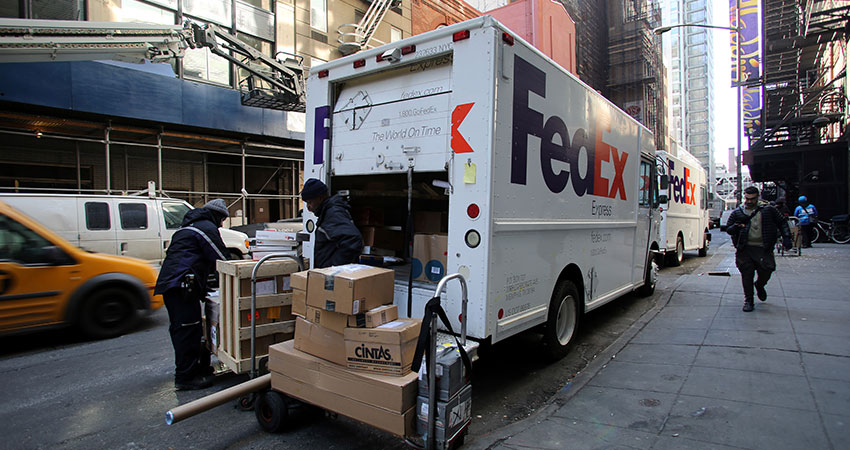FedEx reported a 10% drop in Q4 revenue as demand remains challenged and cost-cutting initiatives continue in an effort to boost the balance sheet, including idling more planes, while announcing it is folding Ground operations into Express in Canada, the first step in a much broader consolidation outlined in April.
Revenue was $21.9 billion in Q4, down from $24.4 billion in 2022, and diluted earnings per share was $4.94, compared to $6.87. Adjusted net income was $1.25 billion, down 31% from $1.8 billion, and the operating margin was 6.9%, compared to 7.9%.
FedEx CEO Raj Subramaniam told analysts the volume drop in Q4 was more than double at Express than at Ground, down 13% vs. 6%, although the rate of decline at both is dropping. Revenue at Express was down 13%. Cost-saving moves at the unit included a 12% reduction in flight hours, the retirement of 18 aircraft, hub productivity measures and shifting to a single daily dispatch of couriers, the latter resulting in savings of $50 million. Another 29 aircraft will be taken out of service in fiscal 2024.
The Ground unit reduced operating expenses by $350 million in Q4, the CEO said, including a dock modernization effort that includes using machine learning to improve volume forecasts, staffing reductions and store closures. Although volume declined 6%, revenue was down just 2% as yield improved through surcharges and product mix.
“Ground remained a standout in this quarter as the team delivered operating income of over $1 billion,” Subramaniam said. “For the first time in company history, the Ground team expanded margins despite lower volumes in the second half. This a clear indication that our Drive transformation is working and gives us confidence as we push forward.”
The Freight unit reduced operating expenses by more than $330 million, with plans to close and consolidate 29 locations by August. The company also conducted another round of furloughs and has limited hiring of salaried employees.
Overall, headcount was reduced by 29,000 at FedEx in fiscal 2023, part of the company’s Drive initiative to shed $4 billion in costs by fiscal 2025 across 14 areas, including $1.8 billion in the current year.
Subramaniam also discussed the just-announced plan to do a phased consolidation of Ground and Express operations in Canada beginning in April 2024, expected to generate $100 million in cost savings by 2025.
“This unification is enabled by the nature of the Canadian market, where the population is heavily concentrated in a few key geographies currently serviced by both operating companies,” he said. “Consolidation will create significant efficiencies throughout the business from first to last mile and across our support teams.”
The Canada effort is the first leg of a broader Network 2.0 consolidation initiative across 20 markets. In some countries, contractors will handle pickup and delivery of Ground and Express packages, while in others they’ll be handled by employee couriers.
“To be clear, we’re not taking a one-size-fits-all approach to our Network 2.0 strategy,” Subramaniam said. “Success depends on a mix of models, including employees and contracting with service providers as all are important pieces of how FedEx moves packages.”
Asked if FedEx had experienced any beneficial spillover from shippers nervous about a potential strike at UPS, where negotiations with the Teamsters continue against a July 31 deadline, EVP and Chief Customer Officer Brie Carere said the company “did not see any material benefit” and does not plan to.
“What I can tell you is that this has opened a lot of doors,” Carere said. “We’re having a lot of great conversations with legacy UPS customers, and we feel really good about the sales pipeline because of the strong value proposition we have versus our primary competitor.”
FedEx also announced that CFO Mike Lenz is retiring July 31 after serving three years. Lenz came onboard just as the pandemic lockdowns began in March 2020.

